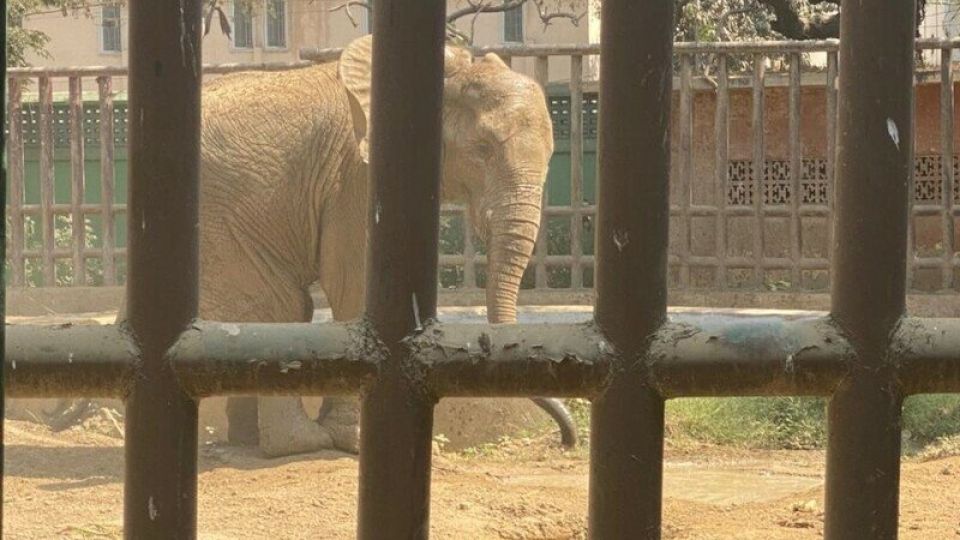March 10, 2023
ISLAMABAD – In a barren and secluded enclosure at the Karachi Zoo, an elephant is fighting for her life. The endangered African elephant has developed problems with her hind legs that have left her limping and in physical distress.
Experts say she needs to be immediately relocated from the zoo to Safari Park.
Noor Jehan, 17, is one of the two elephants who have been caged at the zoo for years now. The animal, who underwent a major tusk surgery last year, is once again in pain. However, this time the ailment has left her partially immobilised.
According to zoo officials, the elephant developed the condition some two months ago and has been receiving treatment for the pain. They also claim that her condition has improved.
“There is nothing to worry about. This condition is very normal in captive animals. Imagine having an aching knee that lasts for a while. It is exactly like that,” an official at the zoo, who wished not to be named, told Dawn.com.
They also said that the zoo was in contact with foreign experts and was expecting a visit from Four Paws — an international animal rights group — soon.
When Dawn.com reached out to Four Paws, their Senior Project Manager Marina Ivanova said that while Four Paws had supported with advice on Noor Jehan’s treatment with anti-inflammatory and pain relief medications, “this is not enough for her”.
“Noor Jehan still lives in the same enclosure, which is unsuitable for her species-specific and physical needs, especially given her current condition,” she revealed.
Ivanova said that the elephant needed a place where she could express her natural behaviours, which could provide enrichments to relieve her condition.
“It is now more urgent than ever to relocate both elephants to prevent any further health issues from the inappropriate keeping conditions,” she stressed.
Last year, a Four Paws team arrived in Pakistan to inspect all four elephants in Karachi — two at the zoo and two at the Safari Park.
During their visit, the vets had, among several other observations, concluded that Karachi Zoo elephants were living with noise pollution and their enclosures lacked a natural habitat. Subsequently, it had suggested that the zoo elephants be moved to the Safari Park.
However, even after more than six months, Noor Jehan and Madhubala — the other elephant — continue to languish at the Karachi Zoo.
Ivanova says Four Paws was “not aware of any steps taken to proceed with the relocation of the two elephants so far”.
Earlier, Karachi Metropolitan Corporation (KMC) Senior Director Khalid Hashmi — who heads the zoo — had told Dawn that it was up to the KMC administrator to start construction of a facility for the elephants at the Safari Park.
“As per recommendations of Four Paws, these elephants should be shifted to Safari, which is indeed a better place than this zoo. We have completed our side of the work and are waiting for their housing facility at the Safari,” he had said.
‘Zoo life is killing elephants’
Noor Jehan’s living quarter at the Karachi Zoo consists of a muddy yard with few logs scattered about and a smaller cage where she used to give rides to children for Rs20. The space is barren — no shrubs, trees or watering holes.

The photo shows a shed which is part of Noor Jehan’s enclosure at the Karachi Zoo. — Photo by author
Elephants, like humans, are social animals and live in herds of eight or more. However, for most of her life, Noor Jehan has lived her life with just one other fellow elephant, confined in a closed space.
According to a 2008 study, zoo life can be deadly for elephants. It states that elephants born and raised in zoos live less than half as long as elephants living in native areas.
Scientists link most of these deaths to obesity because even though the animals are well-fed, they get very little exercise. Moreover, the blame also goes to the high-stress levels that the animals suffer, primarily because of being separated from their mothers — which is exactly what had happened with Noor Jehan as well.
Speaking to Dawn.com, Pakistan Animal Welfare Society (Paws) head Mahera Omar explained that elephants in Karachi today were simply suffering from captivity.
“Elephants fare poorly in captivity. No zoo can meet the social, behavioural and physical needs of these highly intelligent animals. They live in herds, forming complex lifelong bonds with their kin. They mourn their dead, look out for each other, and are self-aware like humans,” she said.
Omar suggested that shifting them back to Safari Park, through careful reintroduction and supervision, will be a “big day and a big win for animal welfare in Pakistan”.
The Paws chief also highlighted that the basic five universal freedoms for animals should be given to the elephants. This includes a life that is full of choices about when, where and how they sleep, eat, bathe, socialise and spend their waking hours.


